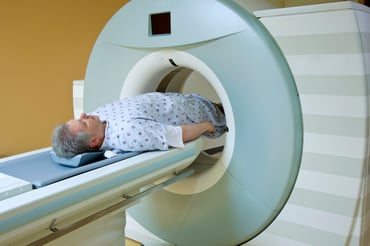
One common method of screening for prostate cancer is the PSA test. In the past, if PSA scores came back high, doctors would likely require further testing for prostate cancer. More recently, it has been noted within the medical community that higher than average PSA levels may not be a definite sign of prostate cancer. PSA tests can help indicate the possibility of cancer, but they may also point to other non-malignant prostate issues.
What is a PSA Test?
PSA stands for prostate-specific antigen. The prostate-specific antigen is produced only by prostate cells, both normal and cancerous; no other cells or organs in the body produce PSA. This lab test evaluates the amount of PSA in the blood. When it was first used, the PSA test monitored prostate cancer progression in those who had already been diagnosed. Later on, it was approved to be used along with a rectal exam to diagnose new cases of prostate cancer in those who were asymptomatic.
What are Normal PSA Levels?
A typical PSA level in men who do not have prostate cancer is under 4ng/mL of blood; however, cancer can still exist in men who have a normal PSA level. Men who have a PSA between 4 and 10 have a 25% chance of having prostate cancer. Once PSA levels are above 10, men have a 50% chance of having prostate cancer. Although PSA levels can assist in diagnosis, this test alone is not a clear indicator that cancer is present.
Who Should Get a PSA Test?
It is recommended by doctors that any male patients above the age of 50 get a PSA test yearly. Additionally, if the patient is African American or has an immediate family member known to have prostate cancer, it is recommended that they begin this type of screening at the age of 40 or 45.
What Causes a High PSA Level?
If your PSA test comes back with higher than average levels, there are a few reasons why it may be elevated.
- Prostatitis: This infection, which can cause swelling and inflammation of the prostate, can also cause increases in PSA levels.
- Regular bike riding: Riding a bike regularly can cause pressure on the prostate that leads to acute rises in PSA levels.
- Hormone supplementation: If you’re currently taking a testosterone supplement, this may lead to higher than average PSA levels.
- Aging process: Rises in PSA levels may be a normal part of aging. Even with a healthy prostate, PSA levels may get higher as you age.
- Recent ejaculation: Most doctors recommend that patients do not ejaculate for 24-48 hours before having their PSA levels tested. This is because ejaculation can cause a temporary increase in PSA levels.
- Enlarged prostate: Some patients show elevated PSA levels with benign prostate hyperplasia or BPH. This condition is a non-cancerous enlargement of the prostate.
Because so many different factors can cause a rise in PSA levels, it is incredibly important to always keep your doctor aware of any medical history or lifestyle choices that could be affecting these levels.
What Causes a Low PSA Level?
Some patients may present with lower than average PSA levels. This can occur for a few reasons.
Medications and Herbal Supplements: Always make your doctor aware of any medications or supplements you regularly take, as these can influence your PSA levels. Long-term usage of statins and aspirin can cause lower than average PSA levels. Taking medications used to treat BPH or urinary symptoms can also affect this.
Even though low PSA levels are what you want to see on a PSA test, you still want to make sure that test results are accurate. If a medication you’re taking causes your PSA levels to show up lower than they are, this could mask a cancer diagnosis. This is why it is important to keep your doctor in the know and inform them of any medications you’re taking to yield the most accurate results.
What’s Next if You Have an Elevated PSA?
If your PSA levels come back as elevated, remember to stay calm because this isn’t a definitive diagnosis. Your doctor will likely recommend further testing and might want to repeat the test later to ensure that some lifestyle factors didn’t influence the levels.
You’ll likely be screened for any non-cancerous prostate conditions as well to help determine a course of action. Before getting a PSA test done, ensure that you’ve informed your doctor about any medications you’re taking or lifestyle factors that could influence your PSA levels.
If you have recently been diagnosed with prostate cancer, rest assured that there are various effective treatment options. Our clinics offer helpful resources and treatment options for patients. Navigating a new diagnosis can be tricky, but our professional team is here to help guide you through treatment and screening options.



